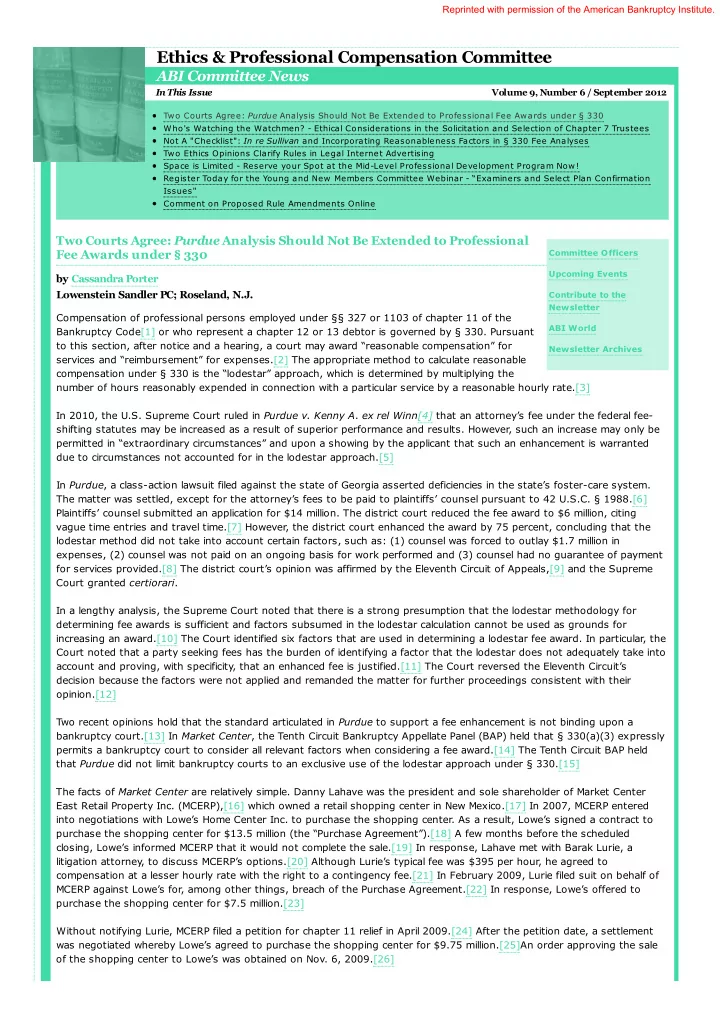

Reprinted with permission of the American Bankruptcy Institute. Ethics & Professional Compensation Committee ABI Committee News In This Issue Volume 9, Number 6 / September 2012 Two Courts Agree: Purdue Analysis Should Not Be Extended to Professional Fee Awards under § 330 Who's Watching the Watchmen? - Ethical Considerations in the Solicitation and Selection of Chapter 7 Trustees Not A "Checklist": In re Sullivan and Incorporating Reasonableness Factors in § 330 Fee Analyses Two Ethics Opinions Clarify Rules in Legal Internet Advertising Space is Limited - Reserve your Spot at the Mid-Level Professional Development Program Now! Register Today for the Young and New Members Committee Webinar - “Examiners and Select Plan Confirmation Issues" Comment on Proposed Rule Amendments Online Two Courts Agree: Purdue Analysis Should Not Be Extended to Professional Fee Awards under § 330 Committee Officers Upcoming Events by Cassandra Porter Lowenstein Sandler PC; Roseland, N.J. Contribute to the Newsletter Compensation of professional persons employed under §§ 327 or 1103 of chapter 11 of the ABI World Bankruptcy Code[1] or who represent a chapter 12 or 13 debtor is governed by § 330. Pursuant to this section, after notice and a hearing, a court may award “reasonable compensation” for Newsletter Archives services and “reimbursement” for expenses.[2] The appropriate method to calculate reasonable compensation under § 330 is the “lodestar” approach, which is determined by multiplying the number of hours reasonably expended in connection with a particular service by a reasonable hourly rate.[3] In 2010, the U.S. Supreme Court ruled in Purdue v. Kenny A . ex rel Winn[4] that an attorney’s fee under the federal fee- shifting statutes may be increased as a result of superior performance and results. However, such an increase may only be permitted in “extraordinary circumstances” and upon a showing by the applicant that such an enhancement is warranted due to circumstances not accounted for in the lodestar approach.[5] In Purdue , a class-action lawsuit filed against the state of Georgia asserted deficiencies in the state’s foster-care system. The matter was settled, except for the attorney’s fees to be paid to plaintiffs’ counsel pursuant to 42 U.S.C. § 1988.[6] Plaintiffs’ counsel submitted an application for $14 million. The district court reduced the fee award to $6 million, citing vague time entries and travel time.[7] However, the district court enhanced the award by 75 percent, concluding that the lodestar method did not take into account certain factors, such as: (1) counsel was forced to outlay $1.7 million in expenses, (2) counsel was not paid on an ongoing basis for work performed and (3) counsel had no guarantee of payment for services provided.[8] The district court’s opinion was affirmed by the Eleventh Circuit of Appeals,[9] and the Supreme Court granted certiorari . In a lengthy analysis, the Supreme Court noted that there is a strong presumption that the lodestar methodology for determining fee awards is sufficient and factors subsumed in the lodestar calculation cannot be used as grounds for increasing an award.[10] The Court identified six factors that are used in determining a lodestar fee award. In particular, the Court noted that a party seeking fees has the burden of identifying a factor that the lodestar does not adequately take into account and proving, with specificity, that an enhanced fee is justified.[11] The Court reversed the Eleventh Circuit’s decision because the factors were not applied and remanded the matter for further proceedings consistent with their opinion.[12] Two recent opinions hold that the standard articulated in Purdue to support a fee enhancement is not binding upon a bankruptcy court.[13] In Market Center , the Tenth Circuit Bankruptcy Appellate Panel (BAP) held that § 330(a)(3) expressly permits a bankruptcy court to consider all relevant factors when considering a fee award.[14] The Tenth Circuit BAP held that Purdue did not limit bankruptcy courts to an exclusive use of the lodestar approach under § 330.[15] The facts of Market Center are relatively simple. Danny Lahave was the president and sole shareholder of Market Center East Retail Property Inc. (MCERP),[16] which owned a retail shopping center in New Mexico.[17] In 2007, MCERP entered into negotiations with Lowe’s Home Center Inc. to purchase the shopping center. As a result, Lowe’s signed a contract to purchase the shopping center for $13.5 million (the “Purchase Agreement”).[18] A few months before the scheduled closing, Lowe’s informed MCERP that it would not complete the sale.[19] In response, Lahave met with Barak Lurie, a litigation attorney, to discuss MCERP’s options.[20] Although Lurie’s typical fee was $395 per hour, he agreed to compensation at a lesser hourly rate with the right to a contingency fee.[21] In February 2009, Lurie filed suit on behalf of MCERP against Lowe’s for, among other things, breach of the Purchase Agreement.[22] In response, Lowe’s offered to purchase the shopping center for $7.5 million.[23] Without notifying Lurie, MCERP filed a petition for chapter 11 relief in April 2009.[24] After the petition date, a settlement was negotiated whereby Lowe’s agreed to purchase the shopping center for $9.75 million.[25]An order approving the sale of the shopping center to Lowe’s was obtained on Nov. 6, 2009.[26]
Recommend
More recommend